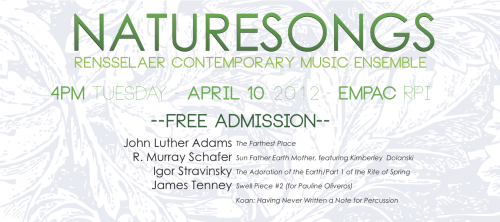Saturday’s Cage/Gould concert at RPI’s EMPAC in Troy NY is the next in a long line of John Cage centenary tributes happening this year. Featuring the Rensselaer Contemporary Music Ensemble directed by Michael Century, the program includes works by John Cage juxtaposed with a recreation of part of Glenn Gould’s final piano concert.
Saturday, November 17 8pm
EMPAC Theater
Rensselaer Contemporary Music Ensemble
Cage Gould
Rensselaer Polytechnic Institute
Troy NY
The french philosopher Elie During knits it all together in a pre-performance lecture (5pm) with the help of a vacuum cleaner (no kidding!) or at least the metaphor of a vacuum cleaner or the memory of the sound of a vacuum cleaner or the memory of the experience of the obliteration of all other sounds thanks to a vacuum cleaner… I guess we’ll have to go to the lecture to find out for sure.
I’ll be providing some electronic dialogues in the concert between Cage and Gould using recordings of their voices. I put together a Max patch to trigger the cues and quickly found that my old-school use of Max’s “coll” object wasn’t quite cutting it. I looked into Max’s new “dict” object as a replacement but hit a limit recalling nested hierarchical statements. So I delved into SQLite and Javascript to put together a relational database of cues and associated tags. Now I’m able to query and sort the cues at will. I can also change the content of the database (add cues, edit tags, etc.) without munging up the patch itself. Lovely!





